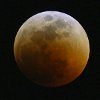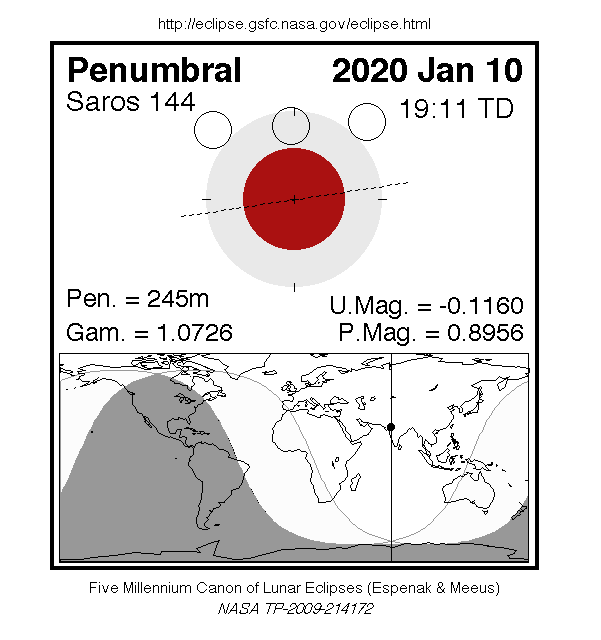Penumbral lunar eclipse on January 10 2020 (Germany)

The Moon information shown here applies to Berlin, Germany on Friday, January 10, 2020. (Local time Europe/Berlin)
| Moonrise to moonset | 7h49m |
| Moonrise | 15:49 |
| Moonset | 08:00 |
| Distance to the center of the Sun | 147,113,431 km |
| Distance to the center of Earth | 379,525 km |
| Moon ilumination (at midnight) | 99.1% |
| Lunar phase | waxing |
| Current zodiac sign the Moon | Cancer ♋ |
| Moon age (days past new moon) | 13.9 |
According to international time UTC, a lunar eclipse will occur on January 10, 2020 which will be visible in some parts of the world. The following shows the cities in Germany from which the eclipse could be visible (note that the following is a short list of some of the main cities, the eclipse may be visible from other cities not listed here). The date and local time of the event shown below.
| City | Eclipse visible? | Phase |
|---|---|---|
| Berlin | Yes | Penumbral |
| Baden-Württemberg | Yes | Penumbral |
| Bayern | Yes | Penumbral |
| Brandenburg | Yes | Penumbral |
| Bremen | Yes | Penumbral |
| Hamburg | Yes | Penumbral |
| Hessen | Yes | Penumbral |
| Mecklenburg-Vorpommern | Yes | Penumbral |
| Niedersachsen | Yes | Penumbral |
| Nordrhein-Westfalen | Yes | Penumbral |
| Rheinland-Pfalz | Yes | Penumbral |
| Saarland | Yes | Penumbral |
| Sachsen | Yes | Penumbral |
| Sachsen-Anhalt | Yes | Penumbral |
| Schleswig-Holstein | Yes | Penumbral |
| Thüringen | Yes | Penumbral |
Information about this eclipse
 This image shows the global map with two regions: the shaded region where you can not see the lunar eclipse, and the blank region, where it can be seen. The image details the type of eclipse, the magnitude of the penumbra and umbra, Saros series to which this eclipse belongs, among other data. The date and time displayed in this image are international date and time, therefore, they might not apply to your country. However, to know the date and exact time of penumbral lunar eclipse in your country, you can see the table below. (Click on the image to enlarge it).
This image shows the global map with two regions: the shaded region where you can not see the lunar eclipse, and the blank region, where it can be seen. The image details the type of eclipse, the magnitude of the penumbra and umbra, Saros series to which this eclipse belongs, among other data. The date and time displayed in this image are international date and time, therefore, they might not apply to your country. However, to know the date and exact time of penumbral lunar eclipse in your country, you can see the table below. (Click on the image to enlarge it).
Eclipse schedule in Germany
The following table shows the schedule and phases of the penumbral lunar eclipse of January 10, 2020 in Germany. For each city we have assigned a time zone which is very precise and it takes into account Daylight Saving Time (if applicable).
Moon alt.: Excellent Good Low Too low
| City | Details | ||||||||||||||||
|---|---|---|---|---|---|---|---|---|---|---|---|---|---|---|---|---|---|
| Event date | Pen. Mag. | Umb. Mag. | Penumbral eclipse begins | Moon alt. | Partial eclipse begins | Umbral eclipse begins | Max. eclipse begins | Moon alt. | Umbral eclipse ends | Partial eclipse ends | Penumbral eclipse ends | Moon alt. | |||||
| Berlin (UTC 1) | 2020-01-10 | 89.6% | 0% | 18:08 | 17 | - | - | 20:10 | 35 | - | - | 22:12 | 51 | ||||
| Baden-Württemberg (UTC 1) | 2020-01-10 | 89.6% | 0% | 18:08 | 13 | - | - | 20:10 | 32 | - | - | 22:12 | 51 | ||||
| Bayern (UTC 1) | 2020-01-10 | 89.6% | 0% | 18:08 | 15 | - | - | 20:10 | 34 | - | - | 22:12 | 52 | ||||
| Brandenburg (UTC 1) | 2020-01-10 | 89.6% | 0% | 18:08 | 17 | - | - | 20:10 | 35 | - | - | 22:12 | 51 | ||||
| Bremen (UTC 1) | 2020-01-10 | 89.6% | 0% | 18:08 | 14 | - | - | 20:10 | 32 | - | - | 22:12 | 49 | ||||
| Hamburg (UTC 1) | 2020-01-10 | 89.6% | 0% | 18:08 | 15 | - | - | 20:10 | 33 | - | - | 22:12 | 49 | ||||
| Hessen (UTC 1) | 2020-01-10 | 89.6% | 0% | 18:08 | 14 | - | - | 20:10 | 32 | - | - | 22:12 | 50 | ||||
| Mecklenburg-Vorpommern (UTC 1) | 2020-01-10 | 89.6% | 0% | 18:08 | 17 | - | - | 20:10 | 34 | - | - | 22:12 | 50 | ||||
| Niedersachsen (UTC 1) | 2020-01-10 | 89.6% | 0% | 18:08 | 14 | - | - | 20:10 | 32 | - | - | 22:12 | 49 | ||||
| Nordrhein-Westfalen (UTC 1) | 2020-01-10 | 89.6% | 0% | 18:08 | 13 | - | - | 20:10 | 31 | - | - | 22:12 | 49 | ||||
| Rheinland-Pfalz (UTC 1) | 2020-01-10 | 89.6% | 0% | 18:08 | 13 | - | - | 20:10 | 31 | - | - | 22:12 | 49 | ||||
| Saarland (UTC 1) | 2020-01-10 | 89.6% | 0% | 18:08 | 12 | - | - | 20:10 | 31 | - | - | 22:12 | 49 | ||||
| Sachsen (UTC 1) | 2020-01-10 | 89.6% | 0% | 18:08 | 14 | - | - | 20:10 | 33 | - | - | 22:12 | 52 | ||||
| Sachsen-Anhalt (UTC 1) | 2020-01-10 | 89.6% | 0% | 18:08 | 16 | - | - | 20:10 | 34 | - | - | 22:12 | 51 | ||||
| Schleswig-Holstein (UTC 1) | 2020-01-10 | 89.6% | 0% | 18:08 | 15 | - | - | 20:10 | 32 | - | - | 22:12 | 48 | ||||
| Thüringen (UTC 1) | 2020-01-10 | 89.6% | 0% | 18:08 | 15 | - | - | 20:10 | 34 | - | - | 22:12 | 51 | ||||
You can read the table above as follows: On January 10, 2020 in Berlin, Europe/Berlin (UTC 1), an penumbral lunar eclipse will start at 18:08, the maximum eclipse will occur at 20:10 when the Moon reaches an altitud of 35°;this event will come to an end at 22:12 and will have a penumbral magnitud of 0.896 (this is the fraction of the Moon obscured by the entrance to The Earth's penumbra) and an umbral magnitud of -0.116 (fraction of the Moon obscured by the umbra of The Earth).
Source: Eclipse Predictions by Fred Espenak and Chris O'Byrne (NASA's GSFC).
